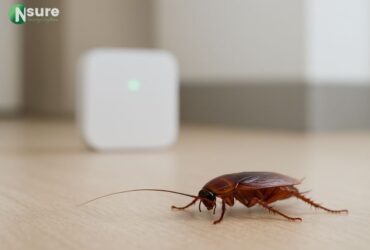We think traps, sprays, and good old-fashioned checks are the only tools employed in pest control and management. But technology is revolutionizing how we guard our homes, and pest-control services and businesses are quickly catching up! The combination of smart-home technology is transforming pest management into something smarter and less invasive. If you are looking for pest control services in Dubai or Sharjah, you must know how these changes are occurring, what they do to homeowners, and how Ensure Pest Control is adjusting!
Traditional Pest Control
What typically occurs in traditional pest control scenarios:
The homeowner first sees evidence of pests such as droppings, nests, and damage and contacts a service provider. Then the technicians come, check the condition manually, and deliver treatments (chemicals, baits, or traps). The problems are only treated after they poke us on our noses a couple of times! Numerous homeowners in Dubai and Sharjah still use this method. Although this method is effective, it’s not without its limits; the infestation could be well-established before discovery, multiple treatments might be required, and monitoring is time-consuming for no reason. But intelligent home integration can make a difference.
Smart Homes and Pest Prevention
Networked sensors & monitoring: The latest systems employ sensors such as motion sensors, humidity sensors, and heat sensors and position them in basements, storage rooms, and kitchens. Such sensors are able to identify unusual activity or pest-friendly conditions.
Data analytics & predictive modeling: Instead of waiting for pests to come and disrupt your peace, pest-control companies and smart-home services can use historical data, climate conditions, and sensor readings to forecast where infestations are likely to strike.
Integration with home-automation platforms: Imagine getting a notification on your smartphone: “Rodent activity detected in kitchen, bait station triggered.” Or your smart-home system automatically lowering humidity and increasing ventilation when sensors detect conditions favourable for pests. This kind of automated prevention is getting popular too.
Automated devices & non-chemical treatments: Smart traps and bait stations can monitor bait levels and send alerts when they need servicing. They can also detect movement or take pictures of pest activity for off-site examination. Implementing non-chemical forms of control such as ultrasonic sound or precision heat treatment will minimize the use of wide-area chemical sprays. Such technology suits customers who prefer minimal disruption, reduced chemical consumption and improved monitoring.
How This Is Transforming Pest-Control Services in Dubai & Sharjah
- Quicker detection, less surprises
- Tailored, data-based service plans
- Less chemical use & environmental footprint
- Peace of mind for landlords & property managers.
- Competitive advantage for pest-control service providers
What Homeowners Can Expect
If you’re considering implementing smarter pest-control practices or choosing a service provider, the following are things to keep in mind:
- Tech-readiness of your service provider
- Transparency of data
- Support for your lifestyle
- Preventative thinking
- Local-market presence & expertise
Challenges & Issues
Cost: Smart sensors, networked devices and data platforms increase expense. Homeowners need to balance the value.
Integration complexity: Not every home or building is smart-home compatible, and adding pest-control sensors can involve wiring or network access.
Data privacy: Monitoring devices can gather data (e.g., motion, thermal), so make sure the service provider treats data responsibly.
Maintenance: Smart devices should be inspected, serviced, and maintained, otherwise, they depreciate easily.
Human experience still counts: Technology does not replace trained technician but rather empowers them. A sophisticated system can notify you of infestation, but still, you need expert inspection, diagnosis and treatment.
The Future: What’s Next?
AI-powered pest identification: Cameras with machine learning could identify pest species and initiate targeted treatments.
Predictive building analytics: Using data analytics we will be able to detect “infestation hotspots” in urban centers such as Dubai and Sharjah.
Robotics & drones: In big commercial buildings, small robots or drones could explore crawl spaces, ventilation shafts or roof voids for signs of pest infestation.
Smart materials: Walls, floorboards or foundations with sensors or pest-resistant materials could become the new norm in new buildings.
Subscription-based smart pest services: Instead of a reactive “call when you see a pest” type, we might see monthly subscriptions with sensor monitoring, scheduled inspections and automated notifications, similar to home-security subscriptions.
Why Ensure Pest Control
Being a pest control service provider in Dubai and Sharjah, Ensure Pest Control stands to benefit from these smart-tech advancements. Our on-the-ground presence in the local market, understanding of UAE pest profiles, and openness to embracing new ways demonstrate why we are an attractive partner for homeowners demanding smarter solutions. By choosing Ensure, you are not only receiving a standard service; you are partnering with a provider familiar with the next big thing in pest management.
Conclusion
Pest control is changing in Dubai and Sharjah, where new builds, mixed-use complexes, and fast-paced urbanisation bring multifaceted challenges. Technology is the way forward. As a homeowner or property manager in search of dependable, forward-thinking protection, it’s logical to opt for suppliers who provide both conventional know-how and adopt smart technology. For pest control services Dubai or pest control services Sharjah, select smart solutions with Ensure.

